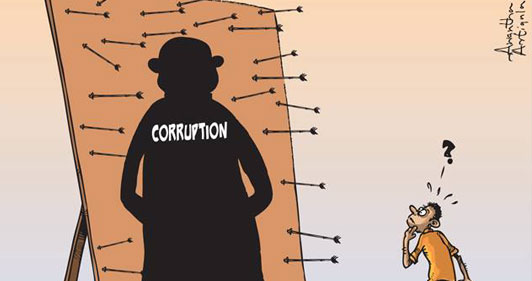According to a study done by Transparency International Sri Lanka, to assess citizen’s perception of the progress made in the 100 day program of the present government, 62% of the respondents stated that the government’s tackling of corruption failed to meet their expectations.
Meanwhile, 32% of the respondents said that they are somewhat satisfied with the government’s actions against corruption while only 6% was found it satisfactory.
Transparency International Sri Lanka, the local chapter of the global movement against corruption, conducted a perception survey covering all districts in the island to assess the perception of the people regarding the progress made in the first 50 days of the government’s 100 day program.
Following is the full text of the release on study
Responding to the survey conducted to assess citizen’s perception of the progress made in the 100 day program of the present government, citizens claimed that they are unsatisfied with the action taken by the government against corruption and that it was “below expectation”.
Transparency International Sri Lanka, the local chapter of the global movement against corruption, conducted a perception survey covering all districts in the island to assess the perception of the people regarding the progress made in the first 50 days of the government’s 100 day program. Accordingly 62% of the respondents stated that the government’s tackling of corruption failed to meet their expectations. 32% of the respondents said that they are somewhat satisfied with the government’s actions against corruption while only 6% was found it satisfactory.
When inquired about their views pertaining to the efforts the government has made to strengthen anti-corruption agencies and mechanism, 48% responded that they are ‘moderately satisfied’. However 43% stated that they cannot be satisfied by the efforts made. Only 9% claimed that they were satisfied by the efforts made.
As to whether an honest effort is being made to deliver on the promises made during the election campaign, 45% of the respondents were of the view that the ‘government is making some effort’. Only 19% responded with a direct ‘yes’ to the same question while 15% were of the view that an honest effort is not being made and 21% stated that more time is required to come to a conclusion.
The survey also inquired into the application of the rule of law during the first 50 days of the 100 days. 57% of the respondents believe that ‘there is a difference even though it is not adequate’ while 19% were of the view that ‘nothing has changed’. 5% of the respondents even went on to say that the situation has worsened. It was only 18% that responded with an affirmative and claimed that there is an improvement in the implementation of the rule of law.
An analysis of the data according to provinces reveals that 77% in the Northern Province and 74% in the eastern province stated that when it comes to the rule of law ‘there is a difference even though it is not adequate’. These are the highest percentages recorded district wise for this particular question.
48% of the respondents responded positively towards the new Cabinet of Ministers saying that they are ‘somewhat satisfied’ about their level of integrity. However 45% believes that there are corrupt politicians within this Cabinet as well.
Citizens also identified several key areas as instances where the government made wrong decisions or took a wrong turn when implementing the 100 day program. They are, not taking legal action against those who are corrupt (21%), not taking special measures to establish good governance (11%), taking too long to deliver on promises (9%), concessions offered by the interim budget inadequate (9%), and not establishing the rule of law as expected (8%). The appointment of unsuitable individuals to important posts and not reacting to the questionable behavior of certain Ministers were other factors that had displeased the populace.
When inquired as to what the government’s priority should be during the balance 100 days, 38% responded by saying that the government should focus on fully completing the activities outlined in the 100 day program. 16% of the respondents were of the view that the focus should be constitutional reforms while 15% believed that the government should deliver on their promises even if it means taking on another 100 days. 13% stated that the government should complete what is easily achievable during the 100 days.
The survey inquired as to whether there is adequate public consultation on the part of the government when formulating important legislation to which 53% responded by saying ‘no’. 18% went on to say that there is no public consultation at all while 23% stated that they are satisfied with the level of consultation.
56% of the respondents were satisfied with the role played by the State media under the leadership of the new government in disseminating accurate information. 29% of the respondents felt that the dissemination of information is still weak while 19% stated that they are satisfied with the status.
The survey covered all 9 provinces of the country and a sample of 35 individuals over 18 years of age was selected from each district to represent rural and urban communities culminating to an overall sample of 875 citizens with 54% female representation and 43% male representation. The sample consisted of citizens belonging to the State and private sector, self-employed, unemployed, housewives and students.

